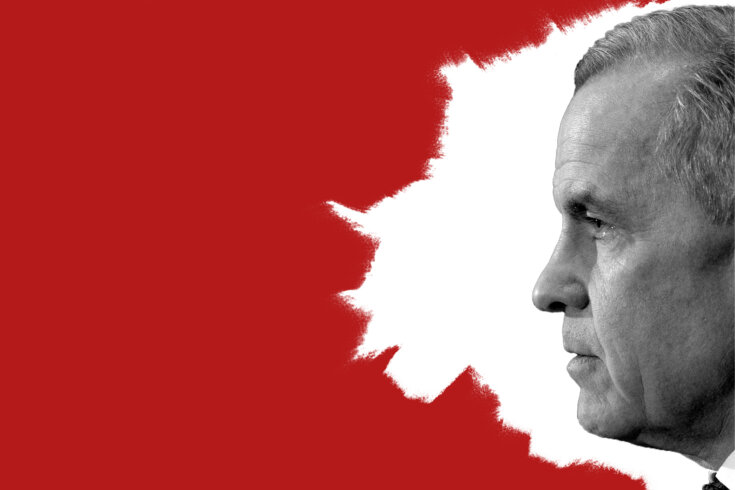The consumer carbon tax is dead. Prime Minister Mark Carney made an ostentatious show of killing it on March 14, holding up a signed order for reporters, setting the collection rate to $0.00—nullifying it.
Yes, it requires an act of Parliament to officially rescind the carbon tax, but for all intents and purposes, it’s gone. What should we make of that? Is it cynical, craven politics and pandering, or is it responsive government? I think it’s a bit of both, but there’s more to it than either of those assessments.
The Liberal Party is taking a victory lap, calling the end of the tax “action for Canadians” and promising that the price of gasoline will come down 17.6 cents on April 1. “Mark Carney got it done,” the party posted on X above an image that reads, “Mark Carney cancelled the carbon tax.” They’re in on team responsive government.
It’s brazen stuff. I remember not so long ago when Liberals were chiding anyone who opposed the carbon tax—ahem, carbon price, they were quick to correct. The Liberals attacked those who opposed it as ignorant, climate-hating, anti-expert buffoons. Such people simply didn’t care about pricing pollution or saving the planet from devastation. Moreover, then prime minister Justin Trudeau, his cabinet, and other Liberal defenders would remind us, the carbon tax is rebated (in most provinces, though not all) and the vast majority, about 80 percent of us, get more back than we spend on it. It’s win-win. Experts say it’s the way. Only a fool wouldn’t support it. Even Carney and those in his cabinet today supported it.
At the risk of seeming out of fashion, I must disclose that I supported the carbon tax back then, and I support it now. It’s not enough to address climate change on its own (and was never billed as such), but it’s table stakes that we ought to be putting up. And if we can’t hack this, I doubt we can handle anything better, unless, perhaps, it’s hidden from view (talk about cynical).
Carney says he wants to tackle outputs at the industrial level (imposing a cost that, at least partially, will be passed on to consumers) while offering incentives to go greener. But no carbon tax. It’s too divisive, he says.
Cost of living is top of mind for Canadians—when isn’t it?—and that shapes the views of the carbon tax. The affordability crisis lingers, perhaps preparing to roar back worse than before in the face of US president Donald Trump’s tariff threat. Accordingly, anything labelled a tax is going to have a hard time on the public auction block these days. No sale.
In the past few years, as economic pressures mounted, Canadians came to oppose hikes of the carbon tax and even the tax itself. The Conservative Party led the charge, poisoning the carbon tax well, and even premising the upcoming 2025 election on “axing” the tax. After a time, the Liberals didn’t put up much of a fight, removing it from home heating oil in 2023 for three years but sticking behind the broader policy. No more.
The most charitable reading of Carney’s move to kill the carbon tax is that, indeed, it was “too divisive” and, indeed, Canadians had come to oppose it—however we got there. We want governments that are responsive to the public and their preferences. But political parties are, let’s say, rather choosy about when they will be responsive. Most Canadians support the death penalty, for instance. Thankfully, that’s not likely to make a return anytime soon. And majorities wanted changes to the carbon tax pre Carney, but I don’t recall many Liberals, including any in the cabinet now, calling for the will of the people to be respected then. No, sometimes we expect politicians to lead, to stick to their guns, not to govern by the polls depending on which way the wind is blowing that day.
Politics is politics, though, and the consensus on the carbon tax became unsustainable because of context, events, and strategic decisions around it. A different context would have probably produced a different outcome. Let’s do a little thought experiment: If the Liberals were up twenty points in the polls right now, with Carney as their leader, and if they’d had been in a position to win for some time, would they be scrapping the carbon tax right now? I doubt it. Of course, Trudeau would still be in power under such a scenario, but you get the idea. The point is, even if the carbon tax was divisive and opposed by a majority of voters, if the Liberals were way up in the polls under Trudeau or Carney, I think they’d be sticking to their guns, saying that now is a time for leadership, especially on climate action. Stay the course, do the right thing, and all of that. They’d keep the tax and defend it, because they would have the political capital to do so. But they don’t now.
Setting politics aside for just a second, philosophically and in the spirit of deep and virtuous democracy, we might say that we want governments to be responsive, but we want them to be responsive in the right way and for the right reasons. Otherwise, we risk politics devolving into an exercise in achieving and keeping power for its own sake or, worse, devolving into mob rule. If a leader is committed to doing the right thing, in the right way, for the right reasons, then we welcome that responsiveness, because we can trust that it will be deployed responsibly. If not, we worry about their capacity to do the right, necessary thing when the going gets tough (say, when they must protect minority rights).
But we can’t really set politics aside for more than a second, certainly not in the real world in which we all must live. The Liberals are a political party that exists to win elections, and they were about to have a hard time winning with the carbon tax hanging around their necks. So off it went. It’s a thoroughly utilitarian, or “pragmatic,” decision, but it’s also a rather standard sort of decision in a representative democracy in which those representatives go back and forth between exercising their own judgment and trying to represent the “will” of their constituents, however that may be measured and executed.
Let’s remain somewhat charitable here for a moment, though. The utilitarian argument for ditching the carbon tax, which many Liberals make implicitly in public and explicitly in private, is that as much as the carbon tax might be a “good” policy—effective in tackling emissions and changing behaviour while not overburdening lower-income earners—it wasn’t a winner anymore. The Liberals think they are better than their opponents. They believe they will do better in power than their opponents would. They think they have better ideas. They think they’re more responsible. They think they’re more capable. But to make any of this supposed superiority count, you have to win.
Under this logic, the greater good calls for sacrifice. Sure, a little sacrifice costs you in the short run, but you’re better off in the long run, because you’re in power and you can do all the good things you want to do—and stop your opponents from doing all the bad things they’d do. The Liberals will defend axing the carbon tax by saying the Conservatives would be far worse either way, on climate and everything else, so this is a small price to pay. You might disagree with this logic; you might even think killing the carbon tax makes the two parties look awfully similar. That’s a debate we can have. But that’s how the utilitarian thinking goes, and it’s a reasonable enough argument to merit further examination, even if we ultimately decide it doesn’t hold up.
The fact is the Liberals have transformed before, and they’ll do it again. That’s what they do, both in the short and long run. That strategy has made them one of the most successful democratic political parties in world history. The Liberals opposed free trade and the goods and services tax, for instance. John Turner fought Brian Mulroney on free trade in the 1980s. Jean Chrétien promised to scrap Mulroney’s sales tax. By the time the Liberals had formed government in 1993 and settled in, they were for the GST and free trade alike.
Is that approach to running and governing cynical? It sure can be. It’s strategic too. Whether enough voters believe that cynicism, that strategy, is reasonable, done in good faith or bad, will be sorted at the ballot box. They might decide it’s cynical and done in bad faith but the party is still preferable to the alternatives on the ballot. If voters don’t buy the Liberal Party’s chameleon politics, they can punish them accordingly. If they don’t, if they reward them, then they can expect more of the same in the future, for better or worse.
Other parties are welcome to play by the same rules in our flawed democracy. They’re also welcome to try to change those rules, to pursue a more honest, accountable, deep democratic politics in which voters have different, perhaps better, options and hold parties to a higher standard. But those same parties might, upon trying, soon come to change their mind. It’s happened before.
Adapted from “Was Killing the Carbon Tax Responsive Government or Cynical Pandering?” by David Moscrop (Substack). Reprinted with permission of the author.





